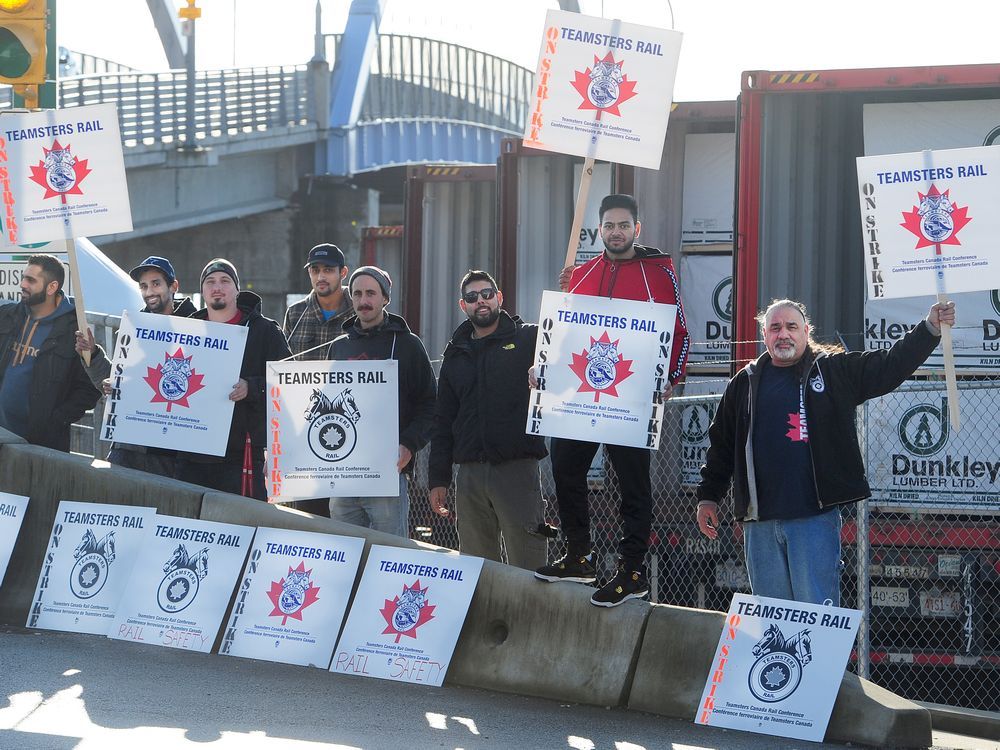B.C.'s trade goods piling up behind CN Rail strike

Credit to Author: Derrick Penner| Date: Tue, 26 Nov 2019 02:19:53 +0000
Typically, 70 ships a week sail in and out of Vancouver harbour, loading and unloading cargo, but that number will quickly start to dwindle if the CN Rail strike drags on, said Chamber of Shipping president Robert Lewis-Manning.
The labour dispute at CN, which has dragged into its seventh day, saw 3,200 train conductors and yard workers represented by the Teamsters Canada Rail Conference walk off the job over safety and rest-time issues, with the work stoppage halting about half of the rail traffic coming in and out of the Port of Vancouver.
“At the moment, we’re not seeing a lot of ships at anchor, which is the physical piece we’ll see,” said Lewis-Manning. “By the end of the week, that will probably change quite dramatically.”
Lewis-Manning said port terminals that handle bulk commodities, such as grain, potash and coal, still have stockpiles to load onto arriving ships, but that will likely change quickly if they aren’t replenished.
“Again, that’s going to get at the critical point probably in the next three or four days,” Lewis-Manning said. “Then, if we work on the assumption there is a resolution to the strike, whether it is today or in a few days, we’re now into weeks or months of recovery from this.”
For the moment, two key container terminals haven’t seen significant disruption to their operations, according to Eric Waltz, president GCT Canada.
GCT operates the Vanterm container terminal on Burrard Inlet and the Port of Vancouver’s massive Deltaport complex. Waltz said they “have not yet experienced significant impacts to rail cargo fluidity since the CN labour strike began.”
“We are, however, concerned that any prolonged disruptions in services could see diversion away from West Coast Canadian ports,” Waltz said.
Canada’s new Agriculture Minister Marie Claude Bibeau met with farmers in Regina on Monday and said the federal government is pushing both sides to reach an agreement, although there is growing pressure for government to step in with back-to-work legislation.
Elsewhere in B.C., CN’s work stoppage has halted grain shipments for northeast farmers just when they need to move the limited amount of crops they have been able to harvest during a rain-soaked fall season.
And the interruption in rail transportation comes at an inopportune time for producers of forest products, which are suffering through terrible markets, punitive U.S. lumber tariffs, and limited timber supplies.
“This is having a real impact on our companies now” at a time they can’t afford more disruptions, said Susan Yurkovich, CEO of the Council of Forest Industries.
Yurkovich said her organization is still tallying the impact, but members have reported that inventories are starting to pile up and production plants are starting to run short of raw materials they need, such as wood chips and, particularly for pulp mills, chemicals that they usually receive by rail.
“People don’t want to tell, commercially, exactly what is going on with their facilities,” Yurkovich said, “but I’ve heard some producers say if they can’t get some of the raw materials (they need) they will be shutting down next week.”
B.C.’s mining sector hasn’t quantified how much it is being affected by the CN strike, but “it is significant,” said Michael Goehring, CEO of the Mining Association of B.C.
“I can say this work stoppage does pose a real and adverse affect on our members in every region of the province,” Goehring said.